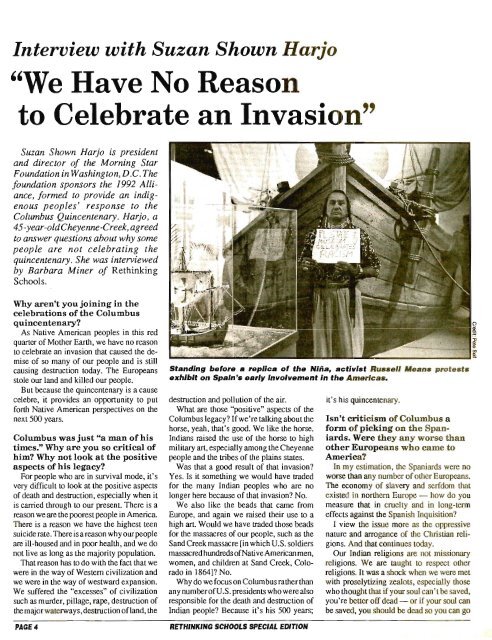RETHINKING COLUMBUS
44.monograph.rethinking.columbus.1991
44.monograph.rethinking.columbus.1991
- No tags were found...
Create successful ePaper yourself
Turn your PDF publications into a flip-book with our unique Google optimized e-Paper software.
Interview with Suzan Shown Harjo<br />
"We Have No Reason<br />
to Celebrate an Invasion"<br />
Suzan Shown Harjo is president<br />
and director of the Morning Star<br />
Foundation in Washington, D.C. The<br />
foundation sponsors the 1992 Alliance,<br />
formed to provide an indigenous<br />
peoples' response to the<br />
Columbus Quincentenary. Harjo, a<br />
45-year-old Cheyenne-Creek, agreed<br />
to answer questions about why some<br />
people are not celebrating the<br />
quincentenary. She was interviewed<br />
by Barbara Miner of Rethinking<br />
Schools.<br />
Why aren't you joining in the<br />
celebrations of the Columbus<br />
quincentenary?<br />
As Native American peoples in this red<br />
quarter of Mother Earth, we have no reason<br />
to celebrate an invasion that caused the demise<br />
of so many of our people and is still<br />
causing destruction today. The Europeans<br />
stole our land and killed our people.<br />
But because the quincentenary is a cause<br />
celebre, it provides an opportunity to put<br />
forth Native American perspectives on the<br />
next 500 years.<br />
Columbus was just "a man of his<br />
times." Why are you so critical of<br />
him? Why not look at the positive<br />
aspects of his legacy?<br />
For people who are in survival mode, it's<br />
very difficult to look at the positive aspects<br />
of death and destruction, especially when it<br />
is carried through to our present. There is a<br />
reason we are the poorest people in America.<br />
There is a reason we have the highest teen<br />
suicide rate.Thereisareason why our people<br />
are ill-housed and in poor health, and we do<br />
not live as long as the majority population.<br />
That reason has to do with the fact that we<br />
were in the way of Western civilization and<br />
we were in the way of westward expansion.<br />
We suffered the "excesses" of civilization<br />
such as murder, pillage, rape, destruction of<br />
the major waterways, destruction of land, the<br />
PAGE 4<br />
Standing before a replica of the Nina, activist Russell Means protests<br />
exhibit on Spain's early Involvement in the Americas.<br />
destruction and pollution of the air.<br />
What are those "positive" aspects of the<br />
Columbus legacy? If we're talking about the<br />
horse, yeah, that's good. We like the horse.<br />
Indians raised the use of the horse to high<br />
military art, especially among the Cheyenne<br />
people and the tribes of the plains states.<br />
Was that a good result of that invasion?<br />
Yes. Is it something we would have traded<br />
for the many Indian peoples who are no<br />
longer here because of that invasion? No.<br />
We also like the beads that came from<br />
Europe, and again we raised their use to a<br />
high art. Would we have traded those beads<br />
for the massacres of our people, such as the<br />
Sand Creek massacre [in which U.S. soldiers<br />
massacredhundredsofNativeAmericanmen,<br />
women, and children at Sand Creek, Colorado<br />
in 1864]? No.<br />
Why do we focus on Columbus rather than<br />
any number of U.S. presidents who were also<br />
responsible for the death and destruction of<br />
Indian people? Because it's his 500 years;<br />
<strong>RETHINKING</strong> SCHOOLS SPECIAL EDITION<br />
it's his quincentenary.<br />
Isn't criticism of Columbus a<br />
form of picking on the Spaniards.<br />
Were they any worse than<br />
other Europeans who came to<br />
America?<br />
In my estimation, the Spaniards were no<br />
worse than any number of other Europeans.<br />
The economy of slavery and serfdom that<br />
existed in northern Europe — how do you<br />
measure that in cruelty and in long-term<br />
effects against the Spanish Inquisition?<br />
I view the issue more as the oppressive<br />
nature and arrogance of the Christian religions.<br />
And that continues today.<br />
Our Indian religions are not missionary<br />
religions. We are taught to respect other<br />
religions. It was a shock when we were met<br />
with proselytizing zealots, especially those<br />
who thought that if your soul can't be saved,<br />
you're better off dead — or if your soul can<br />
be saved, you should be dead so you can go


